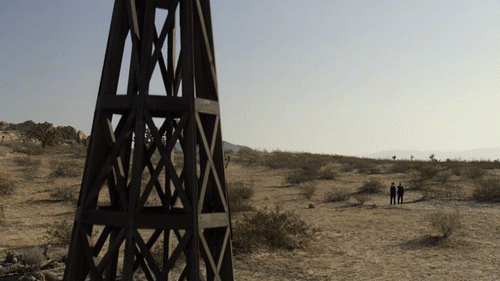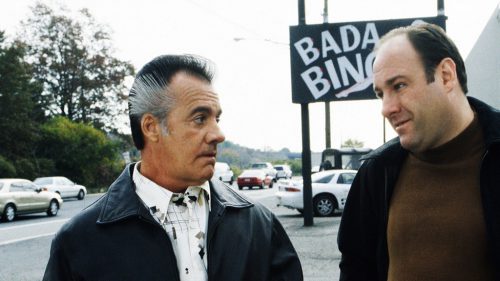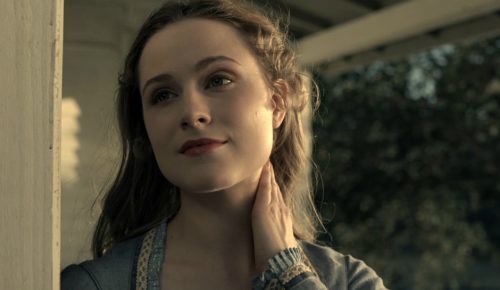
 HBO’s ambitious new show, “Westworld,” splits its time between a wild west-themed adult amusement park populated by humanoid robots and wealthy patrons and an off-site control room where scientists and technicians make sure everything runs without a hitch. The idea comes from a 1973 Michael Crichton movie of the same name, so you can bet that the robots will eventually rebel in some way (probably sans dinosaurs). The appeal of the park for visitors is that they can pursue their wildest fantasies with no apparent consequence. Some drink and gamble in the saloon before following a beckoning prostitute upstairs, and others engage in duels and high-speed chases across the frontier. Basically, prime fodder for HBO subscribers. My friend Scott Jones compared it to Grand Theft Auto, and their appeal seems largely the same, at least to initially attract viewers. Like GTA, this is the kind of stuff I would have wanted to watch as a kid but wasn’t allowed to. Now that I’m here, of course, I realize not all of the junk is what I cracked it up to be, but a lot of it’s pretty great. This paradox is addressed by “Westworld”: that our sinful imaginations are not nearly as well developed as we think them to be, that following our own path is not some liberating breath of fresh air, but, rather, our sin is a privation, a lack.
HBO’s ambitious new show, “Westworld,” splits its time between a wild west-themed adult amusement park populated by humanoid robots and wealthy patrons and an off-site control room where scientists and technicians make sure everything runs without a hitch. The idea comes from a 1973 Michael Crichton movie of the same name, so you can bet that the robots will eventually rebel in some way (probably sans dinosaurs). The appeal of the park for visitors is that they can pursue their wildest fantasies with no apparent consequence. Some drink and gamble in the saloon before following a beckoning prostitute upstairs, and others engage in duels and high-speed chases across the frontier. Basically, prime fodder for HBO subscribers. My friend Scott Jones compared it to Grand Theft Auto, and their appeal seems largely the same, at least to initially attract viewers. Like GTA, this is the kind of stuff I would have wanted to watch as a kid but wasn’t allowed to. Now that I’m here, of course, I realize not all of the junk is what I cracked it up to be, but a lot of it’s pretty great. This paradox is addressed by “Westworld”: that our sinful imaginations are not nearly as well developed as we think them to be, that following our own path is not some liberating breath of fresh air, but, rather, our sin is a privation, a lack.
In order to keep things fresh, the park employs writers in their “Narrative” department who doctor story lines to occupy the guests. In an interesting meta-analysis, one reviewer compared this dynamic to HBO’s challenge with the show overall:
“Like HBO showrunners, Westworld’s designers “pitch” plot arcs. They “massage” story lines. They plant backstories to deepen characterizations. When glitches appear, they panic over the need to halt production, much as “Westworld” itself did, when it shut down during shooting for a rewrite. They are uneasy, at times, about the ethics of their labor. In real life, “Westworld” can’t just be good—it needs to be a hit, too. It’s HBO’s bid for a franchise to succeed “Game of Thrones,” following two pricey flops, “Vinyl” and “True Detective.” For both the show and the show inside the show, the key is to reproduce the alchemy that HBO perfected when it slid the Bada Bing into “The Sopranos”: to provide adult entertainment in both senses.”
Thus, “Westworld” strives for that delicate balance that “Game of Thrones” has achieved: creating something sexy and violent that still has depth, alternating between high-minded explorations of the human psyche and tickling us below the belt. Sometimes it can be tasteless, but it keeps us watching. All that to say, there’s a certain atmosphere pervading these shows, it borders on smut, but tries to maintain artistic integrity while appeasing the premium audience. If you’ve watched this type of TV you know what I mean, and you can tell when it works (GoT), and when it doesn’t (Billions). I note it here because the sex and violence in Westworld, tell us something important about the formative psychological makeup of the robots. Sitting in observation, they don’t know that they’re naked, and in the park, they aren’t programmed to harm any living thing. In this, they’re a lot like pre-fall humans – yet to have an Adam and Eve moment and decide to play God, to taste the fruit themselves and realize their nakedness. “These violent delights have violent ends,” we hear whispered from robot to robot, hinting that the brutality enacted upon them will not be without consequence for the humans involved (plus invoking the Bard). At this stage in the show, the androids are the rude mechanicals: inscrutable yet sympathetic and capable of unexpected insights.
Trying to dissect the meta-commentaries of “Westworld” and assessing its place in the HBO canon can be fun, but more appealing elements of the show, like its biting depiction of humans confronting artificial intelligence, intricate plotting and impressive visual scope, keep me watching.
The Park’s creator, Dr. Ford (Sir Anthony Hopkins), has a complicated Promethean tendency. Pride goeth before a fall, and male arrogance taken to its logical end will be all consuming and destructive; we know this. Ford’s no Dr. Frankenstein, though. His vision for the park is still opaque, and his compromised morality – he’s parlayed his genius into glorified  pimp-dom as the purveyor of adult pleasures for profit – has yet to visibly impact him. He’s trying to play God, whether he acknowledges it or not. Ford’s learned musings are compelling, as is the grand narrative he’s planning for the park that we still haven’t seen, but we know involves a maze, Christological imagery and lots of apocalyptic language.
pimp-dom as the purveyor of adult pleasures for profit – has yet to visibly impact him. He’s trying to play God, whether he acknowledges it or not. Ford’s learned musings are compelling, as is the grand narrative he’s planning for the park that we still haven’t seen, but we know involves a maze, Christological imagery and lots of apocalyptic language.
In the 1973 version, Yul Brynner played the Man in Black, a murderous robot that turned on the human guests and slaughtered them. In this iteration, Ed Harris dons the black hat. He tears through Westworld like it’s a video game, trying to unlock and find the center of a maze. We think he’s a human but it’s still unclear. The MiB has an intimate knowledge of the park, which makes sense cause he says he’s been there for thirty years, so we assume that he’s somehow tied back to Hopkins’ Dr. Ford and his mysterious, deceased, founding partner, Arnold.
Bernard is also interesting. He’s a scientist working for Ford who’s lost his son, is stuck in a loveless affair with a co-worker and secretly tutors the oldest robot in the park, Dolores, by reading Alice in Wonderland to her. Unfortunately, we haven’t seen as much of Bernard the past couple episodes, but he’s still in play as a foil to Ford, an avenue to freedom for Dolores and a potential android himself.
The other man close to Dolores is William. He’s on vacation with his soon-to-be brother-in-law, Logan, who bullies the meeker “Billy.” William is falling hard for the female robot, taking her thoughts and feelings seriously and treating her like a human. Evan Rachel Wood plays Dolores, who’s reminiscent of Alicia Vikander’s Ava in last year’s sci-fi thriller Ex Machina. She appears to inhabit the clichéd trope prevalent in most westerns – the innocent, helpless female in need of male protection – but her friends, Bernard and William, seem to be unhealthily projecting on her, and judging by the fly she swatted off her neck in the pilot, she’s probably playing these guys. To the doting William, she says, “I imagined a story where I didn’t have to be the damsel.” We’re rooting for her to find this path, to escape. Prodded by her other male friend Bernard in one of their conversations, she says, “I think that once I discover who I am, I’ll be free.”
The robots, or “hosts,” of Westworld remain unable to differentiate from the “God” voice of their programming; they’re further inhibited by limited language skills and nightly memory wipes. In addition to Dolores, and with the help of some tinkering from an unknown party at HQ, the rest of the hosts are dreaming, remembering and straying from scripted paths; it appears that consciousness (and upheaval) is coming soon. Once they can make choices for themselves, potential for depictions of the human condition explode. For, as we know, when given a choice, we usually choose wrong. The creators of Westworld and its guests are already bald sinners. So, will the robots’ sentient urges mirror theirs (and ours) and manifest in a push for self-preservation and a thirst for violence? If we take the stray who bashed his own head in with a rock as evidence, their software might be torturing them enough that all they want is a way out. Hopefully, they might show a desire for community and a commitment to end their suffering.
“Westworld” has been a lot of fun so far, and more theological implications are on the horizon.

COMMENTS
4 responses to “Welcome to Westworld”
Leave a Reply















In the absence of GoT, we take the intelligent smut that is Westworld! Love this commentary – anxiously awaiting the “turn” of Dolores.